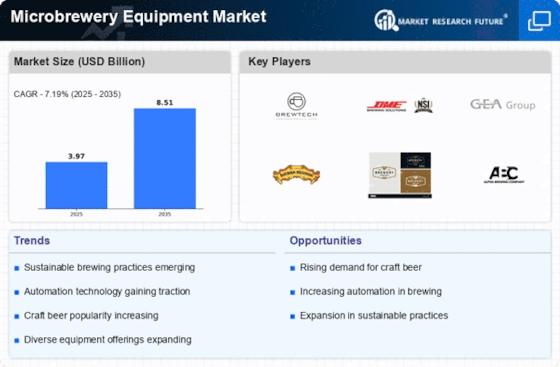Top Industry Leaders in the Microbrewery Equipment Market
 The Microbrewery Equipment market has witnessed substantial growth, driven by the rising popularity of craft beer and the increasing number of microbreweries globally. This analysis provides insights into the competitive landscape, focusing on key players, strategies adopted, market share factors, news and emerging companies, industry trends, current investment patterns, overall competitiveness, and a noteworthy development in 2023.
The Microbrewery Equipment market has witnessed substantial growth, driven by the rising popularity of craft beer and the increasing number of microbreweries globally. This analysis provides insights into the competitive landscape, focusing on key players, strategies adopted, market share factors, news and emerging companies, industry trends, current investment patterns, overall competitiveness, and a noteworthy development in 2023.
Key Players:
ICC Northwest, Inc. (US)
Krones AG (Germany)
LEHUI (China)
BrauKon GmbH (Germany)
Paul Mueller Company (US)
MEURA (Belgium)
Della Toffola SpA (Italy)
Shanghai HengCheng Beverage Equipment Co., Ltd (China)
ALFA LAVAL (Sweden)
GEA Group Aktiengesellschaft (Germany)
Strategies Adopted:
Microbrewery equipment manufacturers adopt various strategies to enhance their market position and meet the evolving needs of microbrewers. Innovation in equipment design and technology is a central strategy, with companies like SS Brewtech focusing on modular brewing systems that offer flexibility and scalability for microbreweries at different stages of growth.
Strategic partnerships and collaborations also play a vital role in expanding market reach. GEA Group, for instance, has established collaborations with microbreweries to co-create and test new equipment solutions tailored to the specific requirements of craft brewers. This strategy allows manufacturers to gain valuable insights into the needs of microbreweries and tailor their offerings accordingly.
Market Share Analysis:
The Microbrewery Equipment market. Product reliability, efficiency, after-sales support, and the ability to offer customized solutions are crucial considerations. Microbrewers prioritize equipment that enables them to maintain consistent quality, scale production as needed, and minimize operational downtime.
Brand reputation and customer testimonials also influence market share, as microbreweries often rely on the experiences of their peers when selecting equipment providers. The ability to provide comprehensive brewing solutions, including fermentation and filtration equipment, adds to the overall competitiveness of equipment manufacturers.
News & Emerging Companies:
The Microbrewery Equipment market often revolves around technological advancements, product launches, and emerging companies entering the space. Emerging companies, such as Specific Mechanical Systems, have gained attention for introducing innovative brewing systems designed to optimize efficiency and reduce energy consumption.
Collaborations with software developers and automation specialists are common strategies for emerging companies seeking to offer integrated solutions. These collaborations aim to provide microbreweries with advanced control systems and data analytics tools to enhance brewing processes and overall efficiency.
Industry Trends:
The Microbrewery Equipment market underscore the importance of automation, sustainability, and ongoing research and development. Manufacturers invest in developing smart brewing systems that leverage automation to streamline processes, reduce manual labor, and enhance overall operational efficiency.
Sustainability features, such as energy-efficient equipment and water recycling solutions, align with the increasing focus on environmental responsibility within the brewing industry. Investments in research and development also support the introduction of cutting-edge technologies, ensuring that microbreweries have access to the latest advancements in brewing equipment.
Competitive Scenario:
The Microbrewery Equipment market is characterized by a balance between established players and innovative newcomers. Key players maintain their market positions by consistently delivering reliable and efficient brewing solutions, while emerging companies contribute to market dynamism with novel technologies and specialized equipment.
As the demand for craft beer continues to rise, equipment manufacturers focus on providing turnkey solutions, including brewhouses, fermentation vessels, and packaging lines. The ability to offer comprehensive brewing solutions positions companies competitively, as microbreweries seek integrated systems that streamline their operations.
Recent Development
The Microbrewery Equipment market in 2023 was Alfa Laval's introduction of a new range of heat exchangers specifically designed for microbreweries. This development addresses the need for efficient heat transfer in the brewing process, ensuring that microbrewers can achieve precise temperature control during various stages of production.
Alfa Laval's investment in developing specialized equipment for microbreweries reflects the company's commitment to meeting the unique requirements of craft brewers. The introduction of these heat exchangers contributes to the overall advancement of brewing technology, supporting the growth and efficiency of microbreweries worldwide.

- Beta
Beta feature










